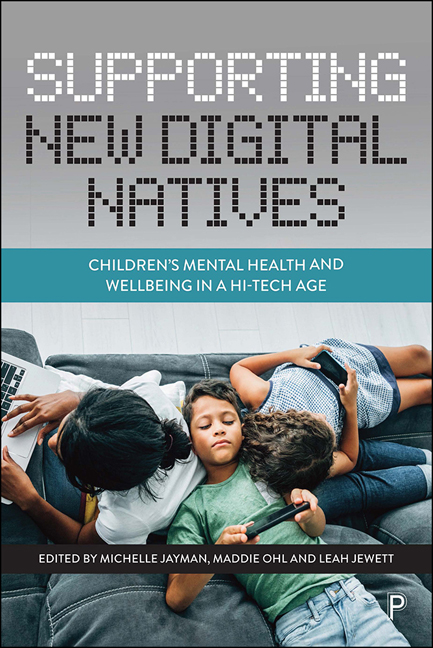Book contents
- Frontmatter
- Dedication
- Contents
- List of figures and tables
- Glossary
- Notes on contributors
- Foreword
- Preface
- 1 Digital lives: growing up in a hi-tech world and staying mentally healthy
- 2 Pyramid Club: building skills for healthy friendships and relationships in a digital age
- 3 Supporting children’s healthy socio-emotional development through play: Book of Beasties – the mental wellness card game
- 4 The School Counselling Partnership: providing support and promoting self-care for school communities
- 5 The Breeze Project: supporting children and young people through Forest School
- 6 Promoting the mental health of girls and young women in the community: the role of Girlguiding
- 7 Supporting families to navigate the changing sex-education landscape: Outspoken Sex Ed
- 8 The Lift Off programme by Red Balloon: online learning and wellbeing support for children who self-exclude from school
- 9 The LifeMosaic project: supporting wellbeing and empowering pupils through design, development and research
- 10 Building better mental wellbeing for children: rebel thinking and innovative practice
- Index
3 - Supporting children’s healthy socio-emotional development through play: Book of Beasties – the mental wellness card game
Published online by Cambridge University Press: 13 May 2022
- Frontmatter
- Dedication
- Contents
- List of figures and tables
- Glossary
- Notes on contributors
- Foreword
- Preface
- 1 Digital lives: growing up in a hi-tech world and staying mentally healthy
- 2 Pyramid Club: building skills for healthy friendships and relationships in a digital age
- 3 Supporting children’s healthy socio-emotional development through play: Book of Beasties – the mental wellness card game
- 4 The School Counselling Partnership: providing support and promoting self-care for school communities
- 5 The Breeze Project: supporting children and young people through Forest School
- 6 Promoting the mental health of girls and young women in the community: the role of Girlguiding
- 7 Supporting families to navigate the changing sex-education landscape: Outspoken Sex Ed
- 8 The Lift Off programme by Red Balloon: online learning and wellbeing support for children who self-exclude from school
- 9 The LifeMosaic project: supporting wellbeing and empowering pupils through design, development and research
- 10 Building better mental wellbeing for children: rebel thinking and innovative practice
- Index
Summary
Play in its variety of forms is intrinsically fun, rousing positive emotions which affect children's wellbeing and mental health. In fact, play is considered such an essential component of children's healthy development that it is recognised by the United Nations Convention on the Rights of the Child (UNCRC) as a right of every child (UN, 1989). Play has been broadly defined as any activity that displays features of non-literality, positive affect, flexibility and intrinsic motivation (Krasnor and Pepler, 1980). Simply put, it is enjoyable, voluntary and done for its own sake. The enormous physical, cognitive, social and psychological benefits of play for children from infancy to adolescence are well documented. A body of evidence indicates that incorporating a playful learning approach in the classroom is a highly effective pedagogical strategy for improving academic outcomes and increasing motivation (Weisberg et al, 2013). Moreover, pedagogies based on guided play (essentially child directed but incorporating adult-scaffolded learning objectives) have been shown to have a positive impact on socio-emotional development and emotional regulation (Ogan and Berk, 2009). Book of Beasties (BoB) – an award-winning school-based intervention which aims to develop children's emotional literacy and support wellbeing – utilises a guided-learning approach through the medium of a traditional card game. Before this chapter explores BoB further, the concept of play and emerging modes of play for new digital natives (NDNs) will be briefly considered.
A radical shift in the nature of play has been linked with the exponential growth of digital technologies. Children growing up in digitally wealthy societies are exposed to technologies from an increasingly young age. A Canadian study which tracked nearly 2,500 two-year-olds revealed that their average weekly screen time was 17 hours, with some toddlers amassing up to 28 hours in a seven-day period (Madigan et al, 2019). Research suggests that electronic and virtual toys have diminished the popularity of physical, traditional modes of play, including board and card games typically played with others. A European Union study (Chaudron et al, 2018) revealed that, by the age of eight, girls in particular were ready to abandon play involving physical toys for digital alternatives. Changes in conventional play habits have been associated with a decline in the child-directed free play afforded by traditional toys and games (Healey and Mendelsohn, 2019).
- Type
- Chapter
- Information
- Supporting New Digital NativesChildren's Mental Health and Wellbeing in a Hi-Tech Age, pp. 41 - 59Publisher: Bristol University PressPrint publication year: 2021



